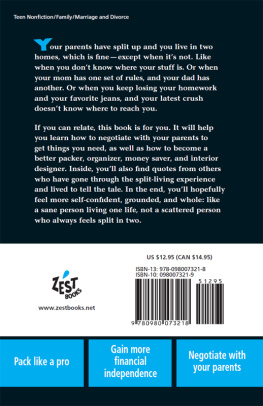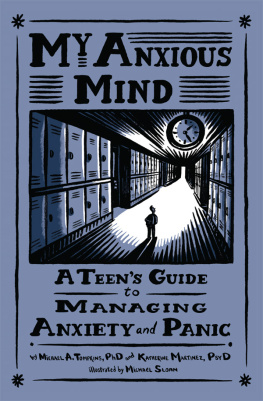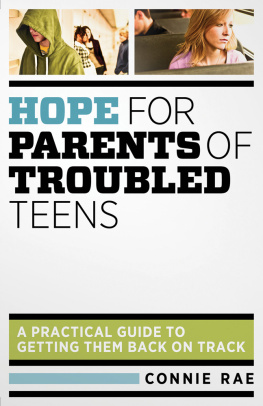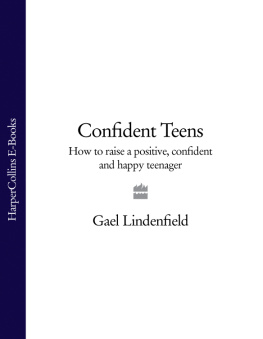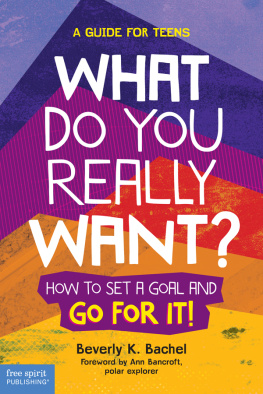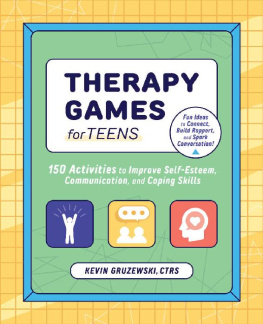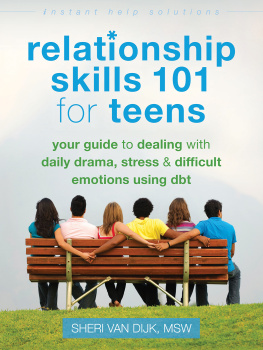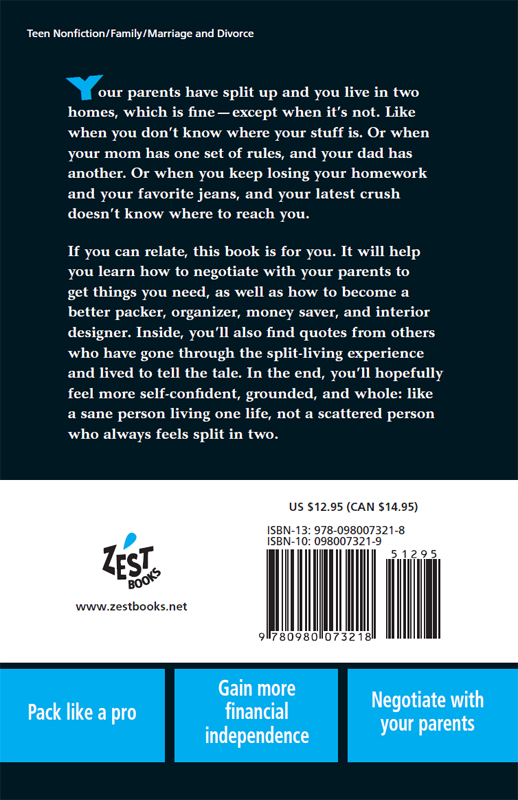First published in 2009 by
Zest Books, an imprint of Orange Avenue Publishing
35 Stillman Street, Suite 121, San Francisco, CA 94107
www.zestbooks.net
Created and produced by Zest Books, San Francisco, CA
2009 by Orange Avenue Publishing LLC
Illustrations 2009 by Corinne Mucha
Typeset in Garth Graphic, Frutiger, and SF Zero Gravity
Teen Nonfiction / Family / Marriage and Divorce
Library of Congress Control Number: 2008936059
All rights reserved. No part of this publication may be reproduced or used in any form or by any means graphic, electronic, or mechanical, including photocopying, recording, or information storage and retrieval systems without the written permission of the publisher.
CREDITS
EDITORIAL DIRECTOR: Karen Macklin
CREATIVE DIRECTOR: Hallie Warshaw
ART DIRECTOR: Tanya Napier
WRITER: Karen Buscemi
EDITOR: Karen Macklin
ADDITIONAL RESEARCH AND EDITING: Jeremy Bagai
ILLUSTRATOR: Corinne Mucha
COVER DESIGN: Tanya Napier
DESIGN AND PRODUCTION: Cari McLaughlin
TEEN ADVISORY BOARD: Atticus Graven, Carolyn Hou, Lisa Macklin, Andrea Mufarreh, Trevor Nibbi, Maxfield J. Peterson, Joe Pinsker, Sasha Schmitz, Hannah Shr
Printed in Canada
First printing, 2009
10 9 8 7 6 5 4 3 2 1
Every effort has been made to ensure that the information presented is accurate. Readers are strongly advised to read product labels, follow manufacturers instructions, and heed warnings. The publisher disclaims any liability for injuries, losses, untoward results, or any other damages that may result from the use of the information in this book.
W hen I was growing up (back in the 80s), my parents were the first ones on my block to split up. I was five, and it was years until I had even one friend in the same situation. Now, having split-up parents is a lot more common. And so are the headaches that come with it.
I dont know about your parents, but mine were very good at telling me and my brother that they still loved us and that the divorce was not our fault. So I got that. But what I never quite understood was how to make my life work while living in two homes. I always left things behind at one place or the other, got confused by the different house rules, and was propelled into a sort of culture shock each time I went from my moms to my dads. (Climate shock, too: In the winter, my mom blasted the heat and my dad never even turned it on!)
For a while, my brother and I both lived mostly with my mom and visited my dad on weekends. Then I moved in with my dad, and visited my mom and brother on weekends and at other times during the year. The switching back and forth was a drag. I walked to school, so I needed two different sets of friends to walk with, depending on what neighborhood I was in. I had to carry all my books back and forth to both houses and give everyone all of my home numbers so they could try to locate me (no cell phones back then). And when both of my parents remarried, I had to learn to share my homes with their spouses.
I felt disoriented and unsettled. And while there were lots of books and TV shows encouraging me to talk about my feelings, I just wanted to know where I was going to get lunch money, who would take me back-to-school shopping, who was going to find out if I skipped math class, and which parent would decide whether I could take that part-time job or go on that ski trip.
The point is thatalthough there still would have been hassles to contend withscheduling, packing, organizing, and negotiating are all skills that would have helped me a lot. And thats why Zest decided to do this book. We hope it helps you feel more grounded, independent, and sane (and less like disowning your parents, stealing their car, and heading as far east or west as that half-tank of gas will take you).

Karen Macklin,
EDITOR
YOUR PARENTS HAVE SPLIT UP.
And whether or not you understand why theyre no longer together, its important right now to keep your own life on track. After all, the most disrupting thing about your parents split-up is that its disrupting.
This is a practical guide to help you through the impractical situation of traveling back and forth between two homes. Whether you shuffle between houses every day, once a week, or once a month, the problem remains: You are always in motion. Youre stuck in the middle, and your stuff is everywhere. You cant find your textbooks, much less your homework, and the notebook that tells you when your assignments are due is always at the other house. One stepparent treats you like youre five years old, and the other seems to think youre five years older than you are. Two sets of rules, two sets of responsibilities: one case of confusion.
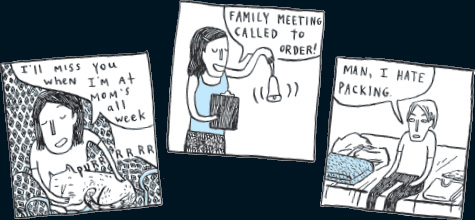
In this book, youll learn how to reclaim your sense of self, gain more independence, and keep your head and stuff together. Youll find tips on how to negotiate with your parents to get things you need, as well as how to become a better packer, organizer, money saver, and interior designer. Youll also read tales from others who have gone through the split-living experience and lived to tell the tale. The whole point is to help you feel less crazed and confused, and more self-confident, grounded, and whole: like a sane person living one life, not a scattered person who always feels split in two.
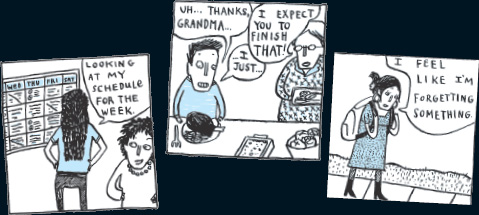
Analyzing
Your New
(or Not-So-New)
Arrangement
Learning How to
Get What You Need
Making It
Feel Like Home
in Both Houses
Dealing with Your
Crazy Schedule
Learning How to
Pack and Haul It All
Creating Some
Financial
Independence
Keeping the Adults
on Track
Moving Forward
with Your Life


Y our parents have split up, and that means you are trekking back and forth on some sort of regular (or irregular) basis. Living in two houses definitely comes with advantages (two allowances, one-on-one time with a parent, and maybe even more independence), but it also comes with problemsas you probably know all too well already. Do you feel it could all work better than it does?
If so, start by analyzing your present living situation. This way you can see what youve got going for you and what youre up against. See which of the arrangements on the following pages best fits your current situation.
Weekend Visitation
You live with one parent during the week and the other for all or part of the weekend.
Pros
Its probably the least disruptive arrangement, at least as far as your social and school life are concerned.
You dont need to have two sets of everything just pack your bags and go.

